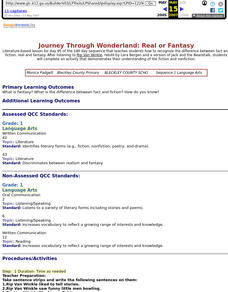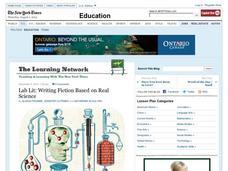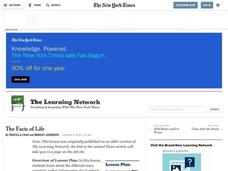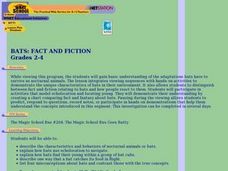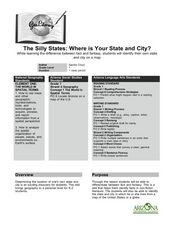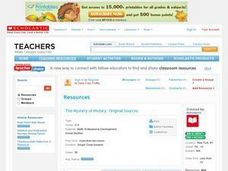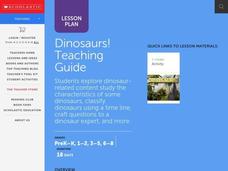Curated OER
Journey Through Wonderland: Real or Fantasy
First graders recognize the difference between fact and fiction, real and fantasy. After listening to Rip Van Winkle, retold by Lara Bergen and a version of Jack and the Beanstalk, 1st graders demonstrates their understanding of fiction...
Curated OER
Imagination Or Observation?
Read the books, "Frog and Toad Are Friends," and "Tale of a Tadpole," to distinguish between fantasy and reality in the books. In this reading comprehension lesson plan, students review the similarities and differences in each book with...
Curated OER
1984, by George Orwell - Fact or Fantasy?
Students read 1984 by George Orwell. They research a country who has dictators similar to Oceania's leaders and create a outline for a paper. In addition, they create a web page from their information.
Curated OER
Find The Hidden Message: Media Literacy in Primary Grades
Learners practice listening to and reading various types of media and text. In groups, learners use video, newspapers, magazines, and more to compare and contrast different types of information. They identify the differences between fact...
Curated OER
Fact or Fantasy Writing
First graders see that some written text is for pleasure and enjoyment while some is for relaying information. They get to experience both types during the lesson. They brainstorm ideas for a story about a new kid in school to write about.
Curated OER
Fiction vs. Nonfiction
Students find the difference between fiction and nonfiction. In this fiction/nonfiction lesson, 1st graders read the story Johnny Appleseed and discuss what makes this a nonfiction story. They listen to a fiction story and see what...
The New York Times
Writing Fiction Based on Real Science - NYTimes.com
Refuse to alienate your scientific-minded young scholars during your creative writing unit. Learners explore how literary writing can reflect observable fact, and be based in actual science. The links include examples of fiction and...
Curated OER
The Facts of Life
Students explore the different ways scientists gather information about extinct animals. They utilize these methods to create illustrated story books about a particular extinct animal.
Curated OER
Palace Adventure
Young language arts learners write and illustrate a short fantasy story based on the book Corduroy. First, learners need to develop a character. Then, through their writing and illustrations, they take their characters on adventures...
Curated OER
Bats: Fact and Fiction
Students describe the characteristics and behaviors of bats. After viewing a video, they explain how bats use echolocation to navigate and how they find their young within a group. They list four misconceptions about the animal and...
Curated OER
Screening Coleridge’s Fantasies: Using Popular Music as a Bridge to Literacy
Twelfth graders use music to aid them in interpreting poetry. In this poetry lesson, 12th graders analyze the lyrics, figurative language, and literary devices of selected music. Students compare the music to the poetry of Samuel...
Curated OER
Bears, Bears, and More Bears!
Students learn the different kinds of bears, discover how bears move, andlearn what bears eat. They also explore bear habitats and list the differences between real bears and imaginary or fantasy bears
Curated OER
Ten Cents a Word
Students recognize the importance of summarizing in this lesson. They "sum up" an article about monarch butterflies. Students practice writing summaries of the article charging themselves 10 cents/word. They try to write the least...
Curated OER
The Silly States: Where Is Your State and City?
First graders read The Scrambled States of America and discuss whether it is real or fantasy as compared to the United States. In this geography lesson, 1st graders identify their city or state on a map and work in groups to color the...
Curated OER
Using Scholastic News to Introduce the Net
Third graders log on to the net, type in the address for Scholastic and browse the subjects for the week. They select one area of interest and generate five interesting facts about the article.
Media Smarts
Teaching TV: Learning With Television
As part of a series of resources focused on the influence of television, elementary students watch an educational program and identify the information presented and analyze the point of view from which the information is presented.
Curated OER
South Carolina Voices: Lessons from the Holocaust
Students read and summarize two different articles that are based on anit-Semitism. In this Holocaust lesson, students discuss if events in the articles could happen in today's society or not.
Rockefeller Archive Center
Understanding Mass Media News
In an age of fake news and photoshopped images, it is vital that 21st century learners development the skills they need to evaluate mass media and assess its validity. A great way to launch such a study is with a carefully crafted lesson...
Curated OER
20,000 Leagues Under the Sea
Guide your class on an adventure 20,000 Leagues Under the Sea with this Hampton-Brown outline. It provides educators with a guide to increase reading comprehension, critical thinking, literary analysis, and reading strategies. This...
Curated OER
The Mystery of History-Original Sources
Students research the events surrounding the Alamo in 1863, and explore the differences between primary and secondary sources of information. They brainstorm lists of items used to research a subject and categorize them as primary or...
EngageNY
Making a Claim: Moon Shadow’s Point of View of the Immediate Aftermath
Body paragraphs are the building blocks of every essay. Pupils view and discuss a model essay using a rubric to evaluate one of its supporting paragraphs. Next, scholars use what they've learned to continue drafting their own literary...
Curated OER
Wolves
Students utilize several different sources to research wolves, after completing the K-W-L process.
Curated OER
Build Your Own Adventure
Sixth graders write a narrative. They choose options for plot and climax within the context of an outdoor survival story.
Curated OER
Dinosaurs
Students will develop goals for inquiry. They will also improve content area reading and research skills. The context of studying dinosaurs will help learners to distinguish from organisms that live presently and those from the past...


